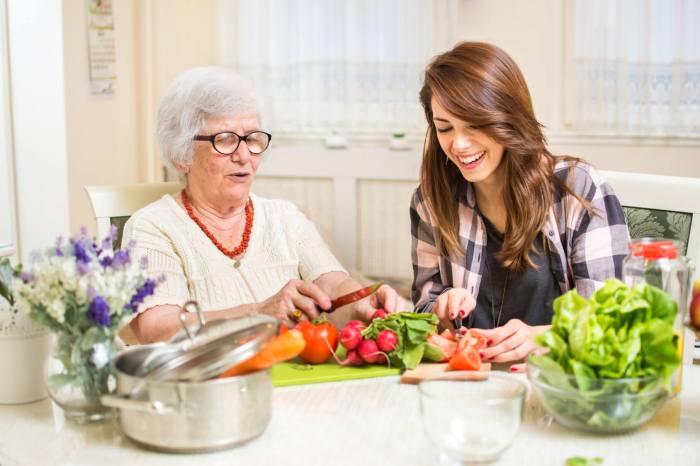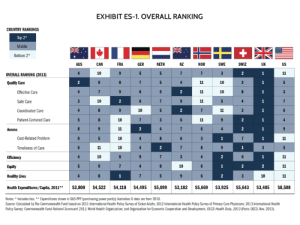
As we age, our nutritional needs evolve, making it crucial to understand the role of nutrition in maintaining the health and well-being of seniors. This article explores the unique dietary requirements of older adults, highlighting the importance of a balanced diet in preventing chronic diseases and promoting overall vitality.
We’ll delve into the challenges seniors face in maintaining good nutrition, including limited mobility, financial constraints, and social isolation, and discuss practical strategies for overcoming these obstacles. We’ll also examine the critical role of social care professionals in supporting seniors’ nutritional needs, emphasizing the importance of interdisciplinary collaboration to ensure optimal outcomes.
Nutritional Needs of Seniors
As individuals age, their nutritional needs change significantly. The aging process brings about various physiological alterations that impact metabolism, digestion, and nutrient absorption. These changes, combined with lifestyle factors, increase the risk of nutrient deficiencies in seniors. Understanding these unique nutritional requirements is crucial for promoting optimal health and well-being in older adults.
Age-Related Changes in Nutritional Needs
Aging is associated with a decline in metabolic rate, which means seniors require fewer calories than younger adults. However, their need for essential nutrients remains the same or even increases.
- Decreased Muscle Mass: As we age, muscle mass naturally declines, leading to a reduced need for protein. However, maintaining adequate protein intake is vital for preserving muscle function, strength, and overall health.
- Changes in Digestive Function: The digestive system slows down with age, leading to reduced nutrient absorption and increased risk of constipation.
- Reduced Appetite: Older adults may experience a decrease in appetite due to various factors, including changes in taste and smell, dental problems, and certain medications.
Common Nutrient Deficiencies in Seniors
The combination of age-related changes and lifestyle factors can lead to increased risk of nutrient deficiencies in seniors. Some common deficiencies include:
- Vitamin D: As we age, our skin’s ability to synthesize vitamin D from sunlight decreases. Additionally, many seniors spend less time outdoors, further contributing to vitamin D deficiency. Vitamin D is essential for calcium absorption, bone health, and immune function.
- Calcium: Calcium is crucial for strong bones and teeth. As we age, bone density naturally declines, increasing the risk of osteoporosis. Seniors may not consume enough calcium-rich foods or have difficulty absorbing calcium due to vitamin D deficiency.
- Vitamin B12: Vitamin B12 is essential for the production of red blood cells and nerve function. As we age, our ability to absorb vitamin B12 from food decreases. This can lead to anemia and neurological problems.
Impact of Nutrient Deficiencies on Health
Nutrient deficiencies can have significant consequences for overall health and well-being in seniors.
- Vitamin D Deficiency: Can lead to osteoporosis, fractures, muscle weakness, and increased risk of falls.
- Calcium Deficiency: Can contribute to osteoporosis, fractures, and weakened bones.
- Vitamin B12 Deficiency: Can result in anemia, fatigue, neurological problems, and cognitive decline.
Importance of Balanced Diet for Senior Health
A balanced diet is crucial for maintaining overall health and well-being, especially as we age. As we grow older, our bodies require specific nutrients to support healthy aging and prevent chronic diseases.
Benefits of a Balanced Diet for Senior Health
A balanced diet plays a significant role in preventing chronic diseases that are more prevalent in seniors, such as heart disease, stroke, type 2 diabetes, and osteoporosis.
- Heart Disease: A diet rich in fruits, vegetables, and whole grains can help lower blood pressure and cholesterol levels, reducing the risk of heart disease. Limiting saturated and trans fats, as well as added sugars, is also essential.
- Stroke: Maintaining a healthy weight and following a diet low in saturated fat and cholesterol can significantly reduce the risk of stroke. Consuming plenty of fruits and vegetables, rich in antioxidants, can further protect against stroke.
- Type 2 Diabetes: A balanced diet can help regulate blood sugar levels and prevent type 2 diabetes. Choosing whole grains over refined grains, incorporating lean protein sources, and limiting sugary drinks can contribute to better blood sugar control.
- Osteoporosis: Adequate intake of calcium and vitamin D is essential for bone health and preventing osteoporosis. Including dairy products, leafy green vegetables, and fortified foods in the diet can help ensure sufficient calcium intake. Sunlight exposure is also important for vitamin D synthesis.
Foods Beneficial for Seniors
Here are some specific examples of foods that are beneficial for seniors and their associated health benefits:
- Salmon: A good source of omega-3 fatty acids, which are important for heart health and brain function. It also provides protein, vitamin D, and potassium.
- Berries: Rich in antioxidants, which help protect cells from damage and may reduce the risk of chronic diseases. They are also a good source of fiber and vitamin C.
- Leafy Green Vegetables: Excellent sources of vitamins, minerals, and fiber. They are particularly rich in calcium, folate, and vitamin K, which are important for bone health, blood formation, and blood clotting.
- Nuts and Seeds: Provide healthy fats, protein, fiber, and various vitamins and minerals. They can help lower cholesterol levels, regulate blood sugar, and support heart health.
- Whole Grains: Provide fiber, which helps regulate digestion and blood sugar levels. They are also a good source of B vitamins and magnesium.
Food Groups and Key Nutrients for Senior Health
| Food Group | Key Nutrients | Importance for Senior Health |
|---|---|---|
| Fruits | Vitamins A, C, and K, potassium, fiber | Support immune function, protect against chronic diseases, regulate blood pressure, and aid digestion. |
| Vegetables | Vitamins A, C, and K, folate, potassium, fiber | Support immune function, protect against chronic diseases, regulate blood pressure, and aid digestion. |
| Grains | Fiber, B vitamins, iron, magnesium | Regulate blood sugar levels, support energy production, and promote heart health. |
| Protein | Protein, iron, zinc, B vitamins | Maintain muscle mass, support immune function, and aid in wound healing. |
| Dairy | Calcium, vitamin D, protein | Support bone health, promote muscle function, and aid in immune function. |
Nutritional Considerations for Specific Health Conditions

As we age, many seniors face chronic health conditions that require special dietary considerations. Understanding these conditions and making necessary dietary adjustments can significantly improve their overall health and well-being.
Diabetes
Diabetes is a chronic condition characterized by high blood sugar levels. Managing diabetes through diet is crucial for preventing complications.
- Limit Sugary Foods and Drinks: Processed foods, sugary beverages, and desserts contribute to high blood sugar levels. Opt for whole grains, fruits, and vegetables instead.
- Choose Low-Glycemic Index Foods: These foods are digested slowly, preventing rapid spikes in blood sugar. Examples include legumes, non-starchy vegetables, and whole grains.
- Monitor Carbohydrate Intake: Individuals with diabetes need to carefully monitor their carbohydrate intake to maintain stable blood sugar levels. A registered dietitian can provide personalized guidance on carbohydrate needs.
- Include Healthy Fats: Unsaturated fats found in avocados, nuts, and olive oil can help regulate blood sugar levels and improve heart health.
Heart Disease
Heart disease is a leading cause of death among seniors. A heart-healthy diet can significantly reduce the risk of developing or worsening heart disease.
- Reduce Saturated and Trans Fats: These fats raise cholesterol levels, increasing the risk of heart disease. Limit intake of red meat, butter, and fried foods.
- Increase Fiber Intake: Soluble fiber found in oats, beans, and fruits can help lower cholesterol levels. Aim for at least 25 grams of fiber daily.
- Limit Sodium Intake: High sodium intake can raise blood pressure, increasing the risk of heart disease. Choose low-sodium options and avoid processed foods.
- Eat Plenty of Fruits and Vegetables: Fruits and vegetables are rich in vitamins, minerals, and antioxidants that promote heart health.
Kidney Disease
Kidney disease affects the kidneys’ ability to filter waste products from the blood. Dietary modifications are essential for managing kidney disease and slowing its progression.
- Limit Protein Intake: Excessive protein intake can strain the kidneys. Consult a healthcare professional to determine the appropriate protein intake based on individual needs.
- Control Potassium and Phosphorus Levels: High potassium and phosphorus levels can worsen kidney function. Limit intake of foods rich in these minerals, such as bananas, dairy products, and red meat.
- Reduce Sodium Intake: Sodium can worsen fluid retention and increase blood pressure, putting additional strain on the kidneys. Choose low-sodium options and avoid processed foods.
- Stay Hydrated: Drinking plenty of water helps flush out waste products and keeps the kidneys functioning properly.
Sample Meal Plan for Seniors with Dietary Restrictions
This sample meal plan is designed for seniors with diabetes, heart disease, and kidney disease. It includes recipes and portion sizes tailored to these specific dietary restrictions.
- Breakfast: 1 cup oatmeal with 1/4 cup berries and 1/2 cup low-fat milk.
- Lunch: 1 cup lentil soup with 1 slice whole-wheat bread and a side salad with vinaigrette dressing.
- Dinner: 4 oz grilled salmon with 1 cup steamed broccoli and 1/2 cup brown rice.
Oatmeal with Berries
Ingredients:
- 1 cup rolled oats
- 1 cup water
- 1/4 cup berries (blueberries, strawberries, or raspberries)
- 1/2 cup low-fat milk
Instructions:
- Combine oats and water in a saucepan.
- Bring to a boil, then reduce heat and simmer for 5 minutes, stirring occasionally.
- Top with berries and milk.
Lentil Soup
Ingredients:
- 1 cup lentils, rinsed
- 4 cups vegetable broth
- 1 onion, chopped
- 2 carrots, chopped
- 2 celery stalks, chopped
- 1 teaspoon dried thyme
- 1/2 teaspoon salt
- 1/4 teaspoon black pepper
Instructions:
- In a large pot, combine lentils, broth, onion, carrots, celery, thyme, salt, and pepper.
- Bring to a boil, then reduce heat and simmer for 30 minutes, or until lentils are tender.
- Serve hot.
Grilled Salmon with Steamed Broccoli and Brown Rice
Ingredients:
- 4 oz salmon fillet
- 1 cup broccoli florets
- 1/2 cup brown rice
- 1 tablespoon olive oil
- 1/4 teaspoon salt
- 1/4 teaspoon black pepper
Instructions:
- Preheat grill to medium heat.
- Brush salmon with olive oil and season with salt and pepper.
- Grill salmon for 4-6 minutes per side, or until cooked through.
- While salmon is grilling, steam broccoli for 5 minutes, or until tender-crisp.
- Cook brown rice according to package directions.
- Serve salmon with steamed broccoli and brown rice.
Navigating Food Labels
Understanding food labels is essential for making informed choices about the foods you eat. Pay attention to the following information:
- Serving Size: This indicates the amount of food the nutritional information is based on.
- Calories: This shows the amount of energy in a serving.
- Macronutrients: This includes carbohydrates, protein, and fat, which provide energy.
- Micronutrients: This includes vitamins and minerals, which are essential for various bodily functions.
- Sodium: This indicates the amount of salt in a serving.
- Sugar: This shows the amount of added sugar in a serving.
Challenges and Strategies for Maintaining Good Nutrition
Maintaining a healthy diet can be challenging for anyone, but seniors often face unique obstacles. Factors like limited mobility, financial constraints, and social isolation can significantly impact their ability to access and prepare nutritious meals. However, with proper planning and support, these challenges can be overcome.
Overcoming Challenges to Healthy Eating
Seniors may face various challenges in maintaining a healthy diet.
- Limited Mobility: Physical limitations can make it difficult for seniors to shop for groceries, prepare meals, and even reach for food items. This can lead to a reliance on processed foods or skipping meals altogether.
- Financial Constraints: Seniors may have fixed incomes that make it difficult to afford nutritious foods, especially fresh fruits and vegetables. They may also be forced to choose between essential needs like medication and healthy food.
- Social Isolation: Loneliness and lack of social support can lead to decreased motivation to cook and eat healthy meals. Seniors may also find it challenging to prepare meals for one person, leading to smaller portions or skipping meals.
Strategies for Maintaining Good Nutrition
Fortunately, there are several strategies that can help seniors overcome these challenges and maintain a healthy diet.
- Meal Planning: Planning meals ahead of time can help seniors make healthier choices and avoid impulsive food purchases. This can involve creating a weekly meal plan, making a grocery list, and preparing meals in advance.
- Grocery Shopping Assistance: Services like grocery delivery or meal delivery programs can be helpful for seniors who have difficulty getting to the store. Some community organizations offer grocery assistance programs to low-income seniors.
- Community Resources: Many communities offer resources that can help seniors maintain good nutrition. This can include senior centers that offer congregate meals, community kitchens that provide affordable meals, and nutrition counseling services.
Helpful Resources for Seniors
Here is a table listing some helpful resources for seniors:
| Resource | Description |
|---|---|
| Senior Nutrition Program (SNP) | A federal program that provides nutritious meals to low-income seniors, either at home or in congregate settings. |
| Meals on Wheels | A national program that delivers meals to homebound seniors. |
| Community Kitchens | Non-profit organizations that provide affordable meals to the community, often with a focus on seniors. |
| Nutrition Counseling Services | Registered dietitians can provide personalized nutrition advice and support to seniors. |
The Role of Social Care in Nutrition
Social care professionals play a vital role in supporting the nutritional needs of seniors. They work closely with healthcare professionals and families to ensure seniors receive adequate nutrition and maintain their overall well-being.
Services Offered by Social Care Organizations
Social care organizations offer a range of services that directly impact seniors’ nutrition. These services provide support, resources, and practical assistance to help seniors maintain a healthy diet.
- Home-delivered meals: This service provides seniors with prepared meals delivered directly to their homes. This is particularly beneficial for seniors who have difficulty preparing meals themselves due to mobility issues, health conditions, or lack of transportation.
- Nutritional assessments: Registered dietitians or nutritionists conduct these assessments to evaluate seniors’ dietary intake, identify any nutritional deficiencies, and develop personalized dietary plans. These assessments help to address specific nutritional needs and prevent potential health problems.
- Support for meal preparation: Social care professionals can provide assistance with meal preparation, such as grocery shopping, cooking, and meal planning. This support can help seniors maintain a balanced diet and ensure they have access to nutritious meals.
- Congregate meal programs: These programs offer seniors the opportunity to socialize and enjoy meals in a community setting. This can help combat social isolation and encourage seniors to eat regular meals.
Interdisciplinary Collaboration in Addressing Nutritional Needs
Effective nutrition support for seniors requires collaboration between healthcare professionals, social workers, and nutritionists. This interdisciplinary approach ensures a holistic understanding of the senior’s needs and facilitates the development of comprehensive care plans.
- Healthcare professionals: Doctors, nurses, and other healthcare providers assess the senior’s overall health status, identify any underlying medical conditions, and prescribe necessary medications. They also play a crucial role in referring seniors to social care organizations for nutritional support.
- Social workers: Social workers address the social and environmental factors that may impact seniors’ nutritional intake, such as financial constraints, transportation issues, and social isolation. They connect seniors with resources and support services to address these challenges.
- Nutritionists: Registered dietitians or nutritionists develop personalized dietary plans based on the senior’s individual needs, preferences, and health conditions. They provide guidance on food choices, portion sizes, and meal preparation techniques.
“Effective interdisciplinary collaboration is essential for ensuring that seniors receive the best possible nutrition support.”
Food and Related Products



The aging population presents a unique opportunity for the food industry to develop products specifically designed for seniors. This market segment requires specialized consideration due to factors like changes in taste preferences, dietary needs, and physical abilities.
Product Creation for Seniors
Creating food products for seniors requires a multi-faceted approach, taking into account the specific needs and preferences of this demographic.
- Texture: Seniors may experience changes in their ability to chew and swallow. Products should have a soft, easily digestible texture, such as purees, soft-cooked vegetables, and ground meats.
- Flavor: Taste buds can become less sensitive with age, so food products should be flavorful and aromatic to enhance palatability. Using spices, herbs, and natural flavorings can make meals more appealing.
- Nutritional Content: As seniors may have increased nutritional needs, products should be fortified with essential vitamins, minerals, and protein. This can help to prevent malnutrition and support overall health.
- Convenience: Senior citizens may appreciate products that are easy to prepare and consume. This could include ready-to-eat meals, single-serving portions, and microwaveable options.
Food and Related Products



Bed and breakfast inns offer a unique opportunity to cater to the diverse dietary needs of senior guests. These establishments can play a significant role in promoting healthy aging by providing nutritious and flavorful meals that are tailored to individual preferences and dietary restrictions.
Bed Breakfast Inns Catering to Senior Dietary Needs
Bed and breakfast inns can create a welcoming and inclusive environment for seniors with specific dietary requirements by embracing the following strategies:* Offer a Variety of Menu Options: Providing a diverse menu that includes options for various dietary restrictions, such as gluten-free, dairy-free, low-sodium, and vegetarian, ensures that all guests can enjoy their meals without feeling limited.
Communicate Effectively
Establish clear communication channels for guests to inform the inn about their dietary needs before their arrival. This allows the inn to prepare accordingly and ensure that meals are tailored to individual requirements.
Collaborate with Registered Dietitians
Consulting with a registered dietitian can provide valuable insights into creating menus that are nutritionally balanced and cater to the specific needs of seniors.
Promote a Culture of Inclusivity
Creating a welcoming and inclusive environment where all guests feel comfortable discussing their dietary needs is crucial. This can be achieved by training staff to be sensitive and knowledgeable about dietary restrictions and by providing clear information about menu options.
Sample Menu for a Bed and Breakfast Inn Catering to Seniors
Here is a sample menu that incorporates healthy and flavorful options for senior guests: Breakfast* Oatmeal with Berries and Nuts: A classic breakfast option that is high in fiber and protein, providing sustained energy throughout the morning.
Scrambled Eggs with Spinach and Smoked Salmon
A protein-rich and nutrient-dense option that is also low in calories.
Yogurt Parfait with Granola and Fruit
A refreshing and light breakfast option that is packed with probiotics and antioxidants. Lunch* Grilled Chicken Salad with Mixed Greens and Quinoa: A protein-rich and balanced meal that is low in calories and high in fiber.
Salmon with Roasted Vegetables
A healthy and flavorful option that is rich in omega-3 fatty acids.
Lentil Soup with Whole Grain Bread
A hearty and satisfying meal that is high in fiber and protein. Dinner* Roast Turkey with Mashed Sweet Potatoes and Green Beans: A classic dinner option that is both flavorful and nutritious.
Baked Salmon with Roasted Asparagus and Wild Rice
A healthy and delicious option that is rich in omega-3 fatty acids.
Vegetarian Chili with Cornbread
A hearty and satisfying meal that is packed with protein and fiber. Dessert* Fresh Fruit Salad: A refreshing and light dessert option that is low in calories and high in antioxidants.
Angel Food Cake with Whipped Cream
A light and airy dessert option that is perfect for those with a sweet tooth.
Yogurt with Berries and Honey
A healthy and delicious dessert option that is packed with probiotics and antioxidants.
Food and Related Products



Cooking and culinary skills are essential for maintaining a healthy and fulfilling lifestyle, especially for seniors. With age, physical limitations or cognitive changes may arise, making it challenging to prepare meals independently. However, there are various strategies and resources available to help seniors navigate these challenges and enjoy the benefits of home-cooked meals.
Cooking Tips for Seniors
- One-Pot Meals: Simplify cooking by preparing meals in a single pot or pan, reducing cleanup and effort. For example, a hearty chicken and vegetable stew can be made in a slow cooker or on the stovetop, requiring minimal preparation and supervision.
- Use Kitchen Gadgets: Leverage kitchen gadgets like electric can openers, food processors, and slow cookers to make tasks easier and more manageable. These tools can help with chopping, blending, and cooking, allowing seniors to enjoy a variety of dishes without excessive strain.
- Plan Ahead and Batch Cook: Plan meals in advance and consider batch cooking to prepare larger quantities of food that can be frozen and reheated later. This reduces the need for daily cooking and ensures a consistent supply of healthy meals.
- Adapt Recipes: Adjust recipes to suit dietary restrictions or preferences. For instance, substituting whole wheat flour for regular flour or using low-sodium broth can help manage blood pressure and cholesterol levels.
- Safety First: Prioritize kitchen safety by using non-slip mats, keeping surfaces clean and dry, and using appropriate cookware and utensils. Seniors should also avoid cooking when fatigued or under the influence of medication that might affect their coordination.
Benefits of Cooking Classes for Seniors
Cooking classes offer numerous benefits for seniors, promoting social interaction, cognitive stimulation, and healthy eating habits.
- Social Interaction: Cooking classes provide a welcoming environment for seniors to connect with others who share similar interests and experiences. The shared activity of cooking and dining together fosters a sense of community and reduces social isolation.
- Cognitive Stimulation: Learning new recipes and techniques challenges the brain, improving memory, focus, and problem-solving skills. Cooking classes can also encourage seniors to engage in activities that require planning, organization, and creativity.
- Healthy Eating Habits: By participating in cooking classes, seniors can learn about nutritious ingredients, cooking methods, and portion control. This knowledge empowers them to make informed choices about their food and develop healthier eating habits.
Nutritious and Appealing Recipes for Seniors
- Roasted Salmon with Lemon and Dill: A simple yet flavorful dish that is rich in omega-3 fatty acids, protein, and vitamins. The combination of lemon and dill provides a refreshing and aromatic touch.
- Chicken and Vegetable Stir-Fry: A quick and easy meal that can be customized with a variety of vegetables, such as broccoli, carrots, and bell peppers. Chicken is a good source of protein, while vegetables provide essential vitamins and minerals.
- Lentil Soup with Whole Wheat Bread: A hearty and satisfying soup that is packed with protein, fiber, and iron. Lentils are a good source of plant-based protein and fiber, while whole wheat bread provides complex carbohydrates.
- Quinoa Salad with Grilled Chicken: A light and refreshing salad that is perfect for warmer weather. Quinoa is a complete protein source, while grilled chicken provides lean protein.
- Baked Sweet Potato with Cinnamon and Maple Syrup: A naturally sweet and satisfying side dish that is high in fiber and vitamins. Sweet potatoes are a good source of vitamin A, while cinnamon and maple syrup add a touch of sweetness and flavor.
By understanding the unique nutritional needs of seniors and addressing the challenges they face, we can empower them to live healthier, more fulfilling lives. Through a combination of balanced diets, supportive social care, and innovative food solutions, we can ensure that seniors have access to the nutrients they need to thrive in their later years.
Key Questions Answered
What are some common nutrient deficiencies in seniors?
Seniors are at increased risk of deficiencies in vitamins D, calcium, and B12, which can impact bone health, muscle function, and cognitive function.
How can I help a senior with limited mobility maintain a healthy diet?
Consider home-delivered meals, meal preparation assistance, or accessible food options that require minimal preparation.
What are some resources available for seniors who need help with nutrition?
Government programs, community kitchens, and nutrition counseling services offer valuable support for seniors with dietary needs.





